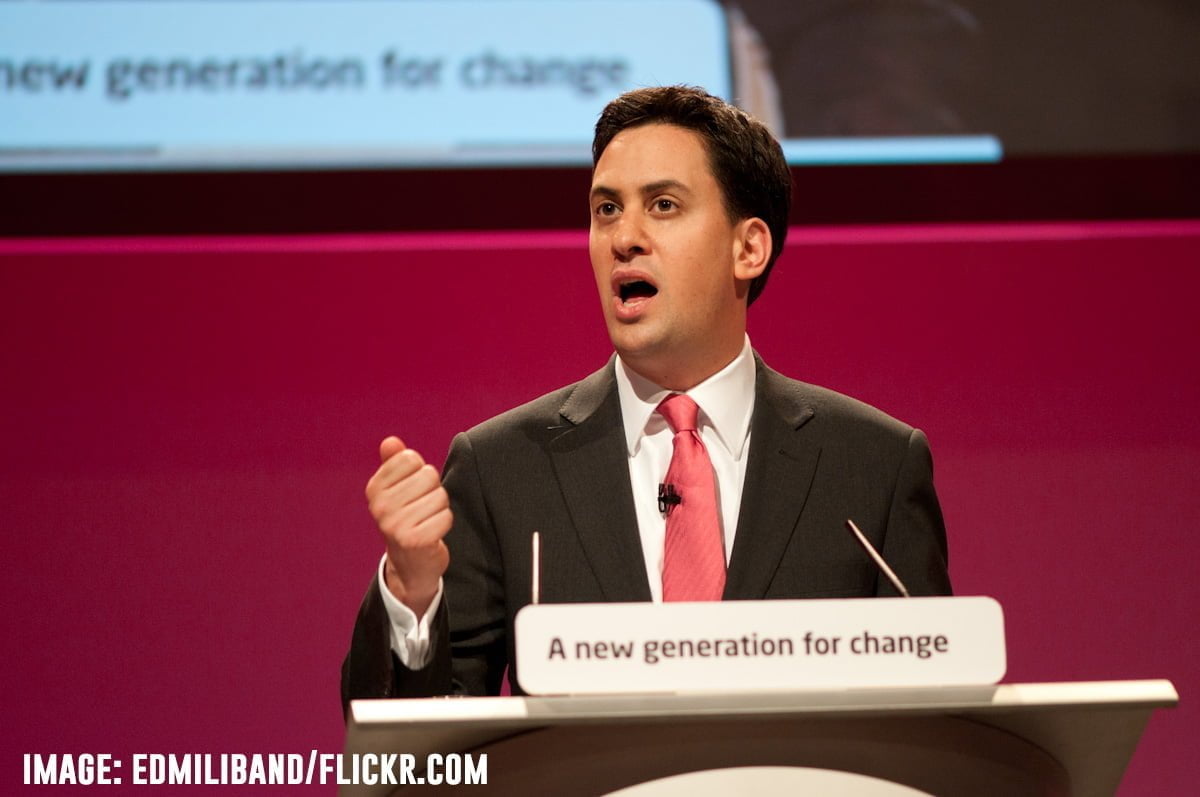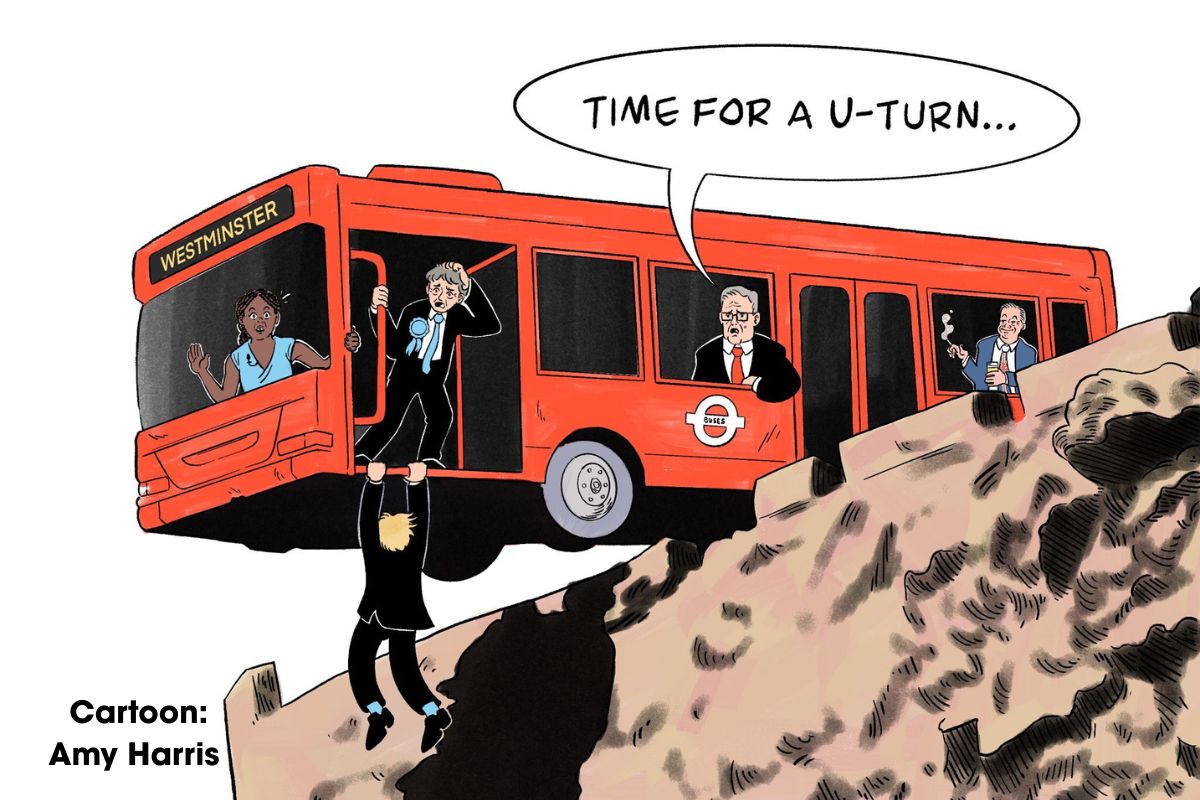Recent opinion polls have put the Tories ahead of Labour for the first time since 2012. Does this mean that the public has made an historic shift to the right? In reality, the contradiction lies between the working class’ interests and the Labour leadership. Daniel Morley argue that the latest polls are a dire warning to Labour: they must fight on a pro-working class, socialist programme to win back support.
Some recent opinion polls have put the Tories ahead of Labour for the first time since 2012. Does this mean that the public has made an historic shift to the right, at a time when the right wing is presiding over possibly the biggest ever fall in living standards and rise in inequality? Is the support for UKIP further evidence of this strange, irrational trend? No, the contradiction between the working class’ interests and their voting intentions is more apparent than real. In reality, the contradiction lies between the working class’ interests and the Labour leadership. This poll is a dire warning to Labour that they must fight on a pro-working class, socialist programme to win back support.
Support for right-wing policies?
It is important to underline that there is no groundswell of support for the right wing, and none at all for rightwing policies. It is clear that the Tories’ slim and possibly vanishing lead is down to Labour’s inability to win the support of its own base rather than any enthusiasm for the Tories, who are at best polling at a low 34%, which reflects little more than their normal base. If polls were broken down on a class basis, what proportion of the working class would be revealed as supporting the Tories?
Many have correctly pointed out that UKIP’s support is contradictory and superficial. Their base is quite obviously extremely reactionary, as are their policies. But it is evident that a large proportion of those voting for them on May 22nd will do so simply as an ‘anti-EU’ and ‘anti-establishment’ vote. This is confirmed by statistics such as that 8 out of 10 UKIP voters want the nationalisation of the energy companies, 3 out of 4 want to nationalise the railways, 84% are in favour of keeping the NHS public, and 2 out of 3 want a ‘substantial increase’ in the minimum wage (see Owen Jones, Open Letter to UKIP Voters). These positions are the direct opposite of UKIP’s actual programme.
It is clear that Labour’s surrendering of its poll lead is a self-inflicted wound due to its refusal to express the increasing anger of the working class. It is failing to articulate this anger in socialist policies that the public in general, not just the working class, would so clearly support (more on this later). We know that polls also reveal mass discontent with politicians in general, who are seen as all the same. Thus, in the absence of an alternative being given by Labour, UKIP have acted as a temporary lightning rod for this anger, taking away votes from Labour and allowing the Tories to slip ahead by default.
Political vapidity revealed
In a very telling move, Miliband’s response to his proven inability to ‘connect’ with voters has been to hire an expensive magician from America, rather than to address the Labour Party’s policies in any way. David Axelrod is the spin doctor and campaign leader credited with the historic success of getting Barack Obama elected as America’s first ever black president.
The thinking that has inspired the hiring of this mercenary at a reputed six figure salary reveals the political vapidity at the top of the Labour party. It is obvious that Obama was elected thanks to the catastrophic experience of eight years of George W Bush, the Iraq war and the economic crisis. The political message of his campaign, that of abstract ‘hope’ for vague ‘change’ was devoid of content, strategy and was superficial in the extreme. That Axelrod has gained a reputation as some sort of political god for his passive riding of the wave of mass discontent that brought Obama to power demonstrates the extreme shallowness in the so-called political class. That Labour have to shell out hundreds of thousands to be told how to appear likeable, instead of being genuinely likeable, says a lot.
We can give much better advice to Miliband for free. The reason you are not popular is that your policies reek of cowardice, compromise and capitulation. Yet another study has just highlighted what the working class is increasingly conscious of – that capitalism does not work and is driving society further and further into two hostile camps. “Britain’s richest 1% have accumulated as much wealth as the poorest 55% of the population put together, according to the latest official analysis of who owns the nation’s £9.5tn of property, pensions and financial assets.” (The Guardian, 15th May 2014)
Contradictions plain to see
You cannot block out the sun with a finger, as the Chinese say. The working class can see what is happening in this country. They know their incomes are falling. Labour itself has just published the finding that “Over the past year, the share of national post-tax income of the top 1% of taxpayers – just 300,000 people – has risen from 8.2% in 2012-13 to 9.8 % in 2013-14. Over the same period, the bottom 90% – a total of 27 million taxpayers – have seen their share of post-tax income fall from 71.3% to 70.4%, according to estimates contained in the latest Income Tax Liabilities Statistics published by HMRC.”
This report sums up Labour’s behaviour. It tries to highlight the problems, in a rather tame manner, but makes matters worse by then refusing to do anything about it, which only highlights Miliband’s shameful weakness.
Labour highlights the paltry nature of the minimum wage, and a majority of the public want it to be raised to a ‘living wage’ – but then Labour refuses to actually call for that. It highlights the scandal of zero-hour contracts, trying to make political gains out of the fact that a majority want them banned. But it refuses to call for that too. It raises expectations with a proposed energy price freeze – but a majority want nationalisation here. The same for the railways. Miliband pathetically complains about the manner of the privatisation of the Royal Mail, which a clear majority oppose, but won’t actually support nationalisation. We see the same spectacle when Miliband complains about cuts, but then, as everyone knows, says he’ll carry them out too! It is obvious that he thinks the public are so stupid that they’ll not notice the contradiction.
It is not good enough to highlight, as he does, that his policies are closer to what the public want than what the Tories offer. But he still doesn’t offer what the public want (and need). The public can see the contradiction, can see he is a compromiser who’ll change nothing, and are repelled by it. This is exemplified by the fact that Labour has boasted that its energy price freeze policy garnered ‘off the scale’ levels of support. But Labour volunteers who canvassed for support for this were forced to mark down as ‘opposed’ those who said they’d rather see nationalisation of the energy companies!
Failure of message, not of delivery
We constantly hear Miliband et al explain their lack of support as due to a failure to ‘get their message across’, and presumably they think this is a trick Axelrod will be able to pull off. But it is obvious that the problem is the message, not some mysterious failure to get it across.
Labour retains the support of the trade union movement, by and large. ¾ of its donations come from the trade unions, which by the way make up the largest voluntary movement in society. Instead of bringing in a hired gun unknown to the Labour ranks to tell them what to do, shouldn’t Miliband change the party’s programme so that it is in line with the interests and views, not just of its base, but of the majority of society as a whole?
The way to ‘get the message across’ is to have a message that people really support, can relate to, and which the party’s rank and file can be enthused to fight for. If the Labour Party’s policies were to campaign for nationalisation of key parts of the economy under democratic workers control, and to support workers taking strike action, it would fire up millions of supporters and potential supporters, who could then campaign on these issues which directly affect the lives and interests of workers up and down the country.
Then Labour really would be ‘anti-establishment’. Attacks would rain in from the rightwing media, and this would only serve to highlight its socialist policies, which would in turn encourage support and sympathy from millions of workers. This is the way to win the next election.






